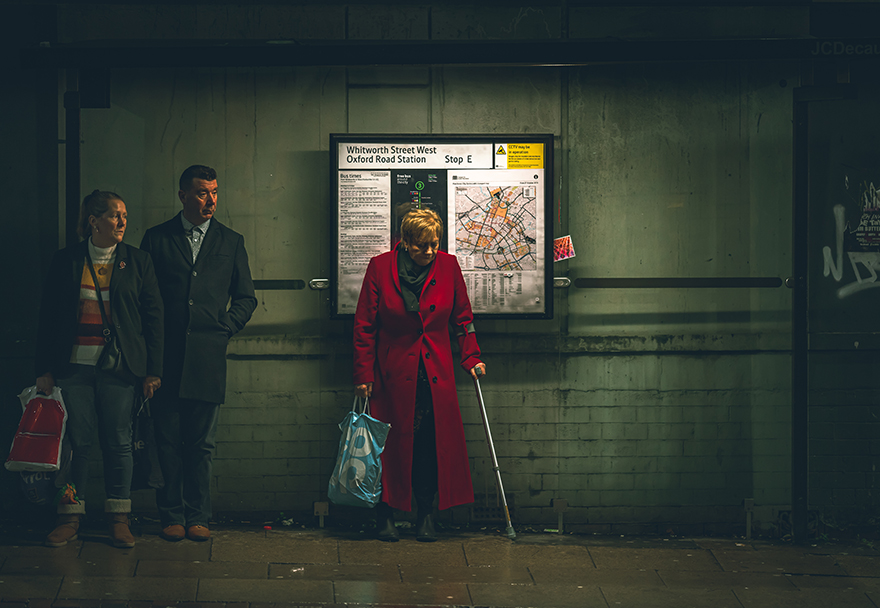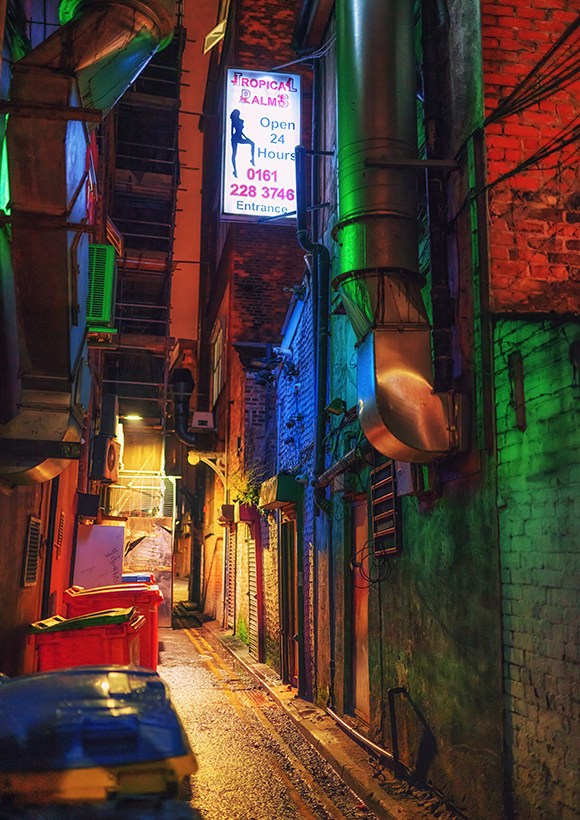essay by wendy roby
Andrew Aitch has learned to train his lens lightly on the residents of Manchester. Seen through the nylon veils of cheap umbrellas and the steamed glass of bus shelters, his subjects are caught in simple acts of contemplation; waiting for a bus, striding over water-coloured puddles or smoking a fag outside a cafe. “I love the unspoken conversations that go on around us,” he says. His affection for – and understanding of – light and colour asks us to consider the beauty in everyday things, the stillness in the move.
Manchester’s famously poor weather could lead you to believe that the city has a depressing air, but these preconceptions fall away in Aitch’s work. Finding riotous, painterly technicolour in the pavements and muted rainbows in the condensation-soaked perspex of tram-stop walk-ways, he gives us permission to pause – even though most of us normally stalk through the city, mindlessly dodging it.

For Aitch, ‘stalking the gloaming’ has become a nightly – almost obsessional – practice of walking the city until he is able to magpie the colour of a resting face or empty alley. He is proudest of the shots where the people are largely anonymous, too. ‘I’m drawn to anything which obscures or conceals figures in an image,’ he says. By denying us specific personalities and easy categorisation, we can better identify with his subjects’ stories, whether calm or animated.
It is easy to be melancholy about the people picked out by a lens; to look for a poignancy that simply isn’t there. But Aitch’s work sings because it doesn’t simply shoot in ‘grim’ locations or treat Mancunians with condescension or loftiness. It is a city where a million lives are bundled into huge coats or giant, fur-trimmed hoods and where all of life is shrouded by cheap umbrellas. But Aitch’s work strips us back to our essential selves, full of colour and light, despite our layers of protection.

essay by wendy roby
Andrew Aitch has learned to train his lens lightly on the residents of Manchester. Seen through the nylon veils of cheap umbrellas and the steamed glass of bus shelters, his subjects are caught in simple acts of contemplation; waiting for a bus, striding over water-coloured puddles or smoking a fag outside a cafe. “I love the unspoken conversations that go on around us,” he says. His affection for – and understanding of – light and colour asks us to consider the beauty in everyday things, the stillness in the move.
Manchester’s famously poor weather could lead you to believe that the city has a depressing air, but these preconceptions fall away in Aitch’s work. Finding riotous, painterly technicolour in the pavements and muted rainbows in the condensation-soaked perspex of tram-stop walk-ways, he gives us permission to pause – even though most of us normally stalk through the city, mindlessly dodging it.
For Aitch, ‘stalking the gloaming’ has become a nightly – almost obsessional – practice of walking the city until he is able to magpie the colour of a resting face or empty alley. He is proudest of the shots where the people are largely anonymous, too. ‘I’m drawn to anything which obscures or conceals figures in an image,’ he says. By denying us specific personalities and easy categorisation, we can better identify with his subjects’ stories, whether calm or animated.
It is easy to be melancholy about the people picked out by a lens; to look for a poignancy that simply isn’t there. But Aitch’s work sings because it doesn’t simply shoot in ‘grim’ locations or treat Mancunians with condescension or loftiness. It is a city where a million lives are bundled into huge coats or giant, fur-trimmed hoods and where all of life is shrouded by cheap umbrellas. But Aitch’s work strips us back to our essential selves, full of colour and light, despite our layers of protection.

